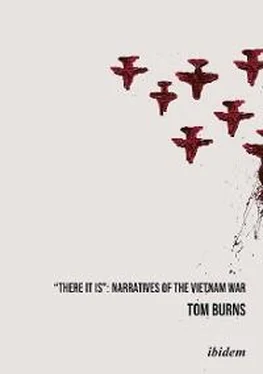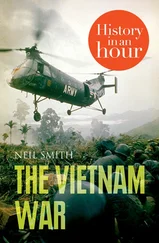Tom Burns - There It Is - Narratives of the Vietnam War
Здесь есть возможность читать онлайн «Tom Burns - There It Is - Narratives of the Vietnam War» — ознакомительный отрывок электронной книги совершенно бесплатно, а после прочтения отрывка купить полную версию. В некоторых случаях можно слушать аудио, скачать через торрент в формате fb2 и присутствует краткое содержание. Жанр: unrecognised, на английском языке. Описание произведения, (предисловие) а так же отзывы посетителей доступны на портале библиотеки ЛибКат.
- Название:There It Is: Narratives of the Vietnam War
- Автор:
- Жанр:
- Год:неизвестен
- ISBN:нет данных
- Рейтинг книги:5 / 5. Голосов: 1
-
Избранное:Добавить в избранное
- Отзывы:
-
Ваша оценка:
- 100
- 1
- 2
- 3
- 4
- 5
There It Is: Narratives of the Vietnam War: краткое содержание, описание и аннотация
Предлагаем к чтению аннотацию, описание, краткое содержание или предисловие (зависит от того, что написал сам автор книги «There It Is: Narratives of the Vietnam War»). Если вы не нашли необходимую информацию о книге — напишите в комментариях, мы постараемся отыскать её.
There It Is: Narratives of the Vietnam War — читать онлайн ознакомительный отрывок
Ниже представлен текст книги, разбитый по страницам. Система сохранения места последней прочитанной страницы, позволяет с удобством читать онлайн бесплатно книгу «There It Is: Narratives of the Vietnam War», без необходимости каждый раз заново искать на чём Вы остановились. Поставьте закладку, и сможете в любой момент перейти на страницу, на которой закончили чтение.
Интервал:
Закладка:
Harry watched them come, trying to engrave on his mind the pattern of their coming, with the pale sun and green of the forest behind them, the abandoned long-house toppled on its side. It was something he wanted to take with him, to remember, to keep when it was all over. There was always, he found, something you wanted that way, something that summed it up for you and that nobody could take away (15).
There is an implicit contrast in the novel between this semi-wild region, inhabited by the indigenous peoples whom the French collectively called montagnards , or mountain-folk, and the urban space of Saigon, whose leaders will determine the fate of these tribal peoples. Divided into several language groups, the montagnards had had a distinct culture for thousands of years within the country. First enlisted by the French to fight against the Viet Minh, they were recruited by both sides during the American war (their casualties were exceptionally high, estimated at one-third of a total of one million people). 36Among Diem’s political blunders was his refusal to accommodate the ethnic minorities like the montagnards and the Chinese, or to conciliate the large religious sects like the Cao Dai and the Hoa Hao. The montagnards were doomed by geography; they lived and hunted in an area that controlled strategic supply routes from north to south. Instead of courting them, Diem sought to reduce their influence by means of a Land Development Program that forcibly resettled them and put ethnic Vietnamese on their lands. By 1963, this policy had divided them into tribes that either supported the NLF or claimed independence from all outside authorities. 37
To prevent the montagnards from assisting the Vietcong, the CIA developed a village defense program that was to be implemented by the US Special Forces, which armed and supplied them. 38Special Forces teams had begun training montagnards since 1961, creating the basis for the so-called Civilian Irregular Defense Groups (CIDG). The village defense project was designed to combine military defense with socio-economic improvement programs. The montagnards evidently saw military service as an opportunity to protect themselves and their mountain highlands against the encroachment of ethnic Vietnamese, 39and the US in turn saw this attitude as an opportunity to control the highland supply route. Diem’s disregard for ethnic minorities and his incompetent ARVN commanders, however, often resulted in the unwillingness of the CIDGs to fight for the government, a situation that is reflected in Hempstone’s novel. 40
Politically, the author is skeptical about any successful outcome for the war at the same time that he seems to uphold his protagonist’s anti-Communist ideals. When a correspondent asks an American captain in the field, an advisor to an ARVN artillery battery, if the war is being won, the man replies, “Wouldn’t say that. But we sure aren’t winning” (141). Diem’s betrayal of the montagnards, one of the reasons why he is portrayed in the novel as a leader who does not deserve to survive, is shown in two narratives that run parallel to the public narrative of the Saigon coup outlined above. These three narrative strands are alternated in small clusters of chapters.
In the Diem narrative, the Ngo brothers reveal themselves through their private dialogues, in which they are mainly concerned with staying in power by dealing with the multiplying crises in an ad hoc manner. For example, they install General Trang, a man entirely moved by greed, into the lucrative Saigon command in order to control the local situation more easily: corruption is thus institutionalized for the continuance of political survival. Their conversations also make it clear that any requests from the montagnards and other ethnic groups will have to wait until the current crisis is resolved. “The main thing is the Buddhist plot” (81), they conclude. The cynical pragmatism of the government is reflected in similar attitudes expressed by the leader of the CIA operation intended to support the regime.
In the novel, it is Diem who suggests raiding the Xa Loi pagoda and arresting the dissidents and Nhu who worries about the political repercussions of the wholesale arrests: “The army, if it could not defeat the Vietcong, at least could handle street mobs. But the riots forced him to make arrests and he knew that this antagonized the army. Each of the arrested demonstrators, bonze or student or coolie, had relatives in the army” (173). Nhu’s plan is to uncover the ringleaders through torture applied by a Chinese sadist named Mong Le. Nhu regards torture as a distasteful but necessary method of extracting information, with a fastidiousness that makes him doubly repugnant. He also resents “his role of eminence gris to the regime” (180) because he considers himself the stronger of the two brothers.
The various motives of the plotters against the regime are plausibly summed up by General Trang: Nhu’s secret police, the regime’s unwise persecution of the Buddhists, Diem’s lack of leadership, the military’s resentment of counselor Nhu, and the constant change of military commands. Trang shares these sentiments but has survived so far by being shrewd and cautious: “He had won his general’s stars not by achieving great victories but by avoiding terrible defeats” (191), an admission that reveals the impossibility of waging a successful war. Victory or defeat is not uppermost in the minds of the generals, who have more to gain by maintaining “a permanent stalemate”:
As long as the war lasted, the power and the prestige of the generals would remain high, more American money and U.S. equipment would continue to flow into the country, there would be countless opportunities for a clever officer to make himself a wealthy one (191-192).
The main narrative concerns the protagonist Harry Coltart and his efforts to maintain the montagnards as a strong partisan group in the fight against the Vietcong. A CIA operative, his political and military mission becomes complicated by his personal involvement with the Koho tribe. He forms a blood-brother relationship with the Koho chief, Yé, who gives him his teenage daughter, Ilouha, as a wife. Coltart constantly tries to convince Yé that the Vietcong are his people’s enemies. When Yé demands to know why this is so, Coltart replies: “Because they are Communists. Because they will enslave you. Because they will steal your land and make cattle of you” (21). Yé is understandably more concerned with his people’s welfare than questions of ideology, and he also knows that his people’s traditional enemies have been the Annamese (Vietnamese) of the plains. To the Annamese, “the montagnards were moi , savages, animals to be shot on sight” (24).
For this tribal people, stories are often the best argument. Coltart tells about the T’ai people from the north, who have felt the negative Communist influence on their lives. “You know they are taxed, that their young hunters are taken for the militia, that their chiefs are voiceless and cast aside like broken gourds?” (32). The patjao , or priest, points out, however, that such a situation may prevail in the north, but in these lands the Vietcong pay for food, news, and scouts, and they leave the montagnard women alone, in blatant contrast to the Annamese, who (the chief adds), “take our food, even when our granaries are almost empty. They break our laws. They use our women. They take our young men for the army, when they can catch them’” (33). These cogent arguments cannot be refuted by Coltart, a circumstance that would seem to be a critical objection to his presence, but he is liked personally by the chief and the tribe, and personal acceptance counts for much in their culture. He has, for example, mastered the local customs as well as the language, as he demonstrates in a ceremony of tribal chiefs by slaying a water buffalo with a single blow, which is considered a good omen, but despite his pleading Coltart cannot change the historical reality of hostility to the Vietnamese. He decides he can only get the allegiance of the tribe by means of a promise from Diem himself to respect the montagnard lands, which would in turn be respected as law by the tribe. As it is nearly a foregone conclusion that Coltart will fail, the attempt makes him the tribe’s doomed champion, a man who becomes disillusioned by his experience with the CIA and the American policy of backing Diem in any situation.
Читать дальшеИнтервал:
Закладка:
Похожие книги на «There It Is: Narratives of the Vietnam War»
Представляем Вашему вниманию похожие книги на «There It Is: Narratives of the Vietnam War» списком для выбора. Мы отобрали схожую по названию и смыслу литературу в надежде предоставить читателям больше вариантов отыскать новые, интересные, ещё непрочитанные произведения.
Обсуждение, отзывы о книге «There It Is: Narratives of the Vietnam War» и просто собственные мнения читателей. Оставьте ваши комментарии, напишите, что Вы думаете о произведении, его смысле или главных героях. Укажите что конкретно понравилось, а что нет, и почему Вы так считаете.












